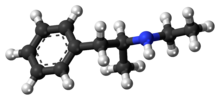Etilamfetamine
 | |
 | |
| Clinical data | |
|---|---|
| Routes of administration | Oral, sublingual, insufflated, inhaled (vaporized), intravenous, rectal |
| ATC code | |
| Legal status | |
| Legal status |
|
| Pharmacokinetic data | |
| Metabolism | Hepatic |
| Excretion | Renal |
| Identifiers | |
| |
| CAS Number | |
| PubChem CID | |
| ChemSpider | |
| UNII | |
| KEGG | |
| ChEMBL | |
| CompTox Dashboard (EPA) | |
| ECHA InfoCard | 100.230.711 |
| Chemical and physical data | |
| Formula | C11H17N |
| Molar mass | 163.264 g·mol−1 |
| 3D model (JSmol) | |
| |
| |
| (verify) | |
Etilamfetamine, also known as N-ethylamphetamine and formerly sold under the brand names Apetinil and Adiparthrol, is a stimulant drug of the amphetamine family. It was invented in the early 20th century and was subsequently used as an anorectic or appetite suppressant in the 1950s,[2] but was not as commonly used as other amphetamines such as amphetamine, methamphetamine, and benzphetamine, and was largely discontinued once newer drugs such as phenmetrazine were introduced.
Pharmacology
[edit]Ethylamphetamine is a potent dopamine releasing agent in vitro, with an EC50 of 88.5 nM.[3] This is about 10-fold lower than the EC50 of amphetamine.[3] The EC50 values of ethylamphetamine for induction of norepinephrine and serotonin release were not reported.[3] Ethylamphetamine can also be N-dealkylated into amphetamine (5–18% excreted in urine after 24 hours).[4]
Chemistry
[edit]The molecular structure of ethylamphetamine is analogous to methamphetamine, with an ethyl group in place of the methyl group.[Note 1] It can also be considered a substituted amphetamine, with an ethyl group on the amphetamine backbone.[Note 2][Note 3]
Recreational use
[edit]Ethylamphetamine can be used as a recreational drug and, while its prevalence is less than amphetamine's, it is still encountered as a substance taken for recreational purposes.
Ethylamphetamine produces effects similar to amphetamine and methamphetamine, though it is of weaker potency.[citation needed] At equipotent dosage, ethylamphetamine is subjectively less euphorigenic.[citation needed]
See also
[edit]- 3-Fluoroethamphetamine
- Dimethylamphetamine
- Fenfluramine
- Isopropylamphetamine
- Propylamphetamine
- Butylamphetamine
References
[edit]- ^ Anvisa (2023-03-31). "RDC Nº 784 - Listas de Substâncias Entorpecentes, Psicotrópicas, Precursoras e Outras sob Controle Especial" [Collegiate Board Resolution No. 784 - Lists of Narcotic, Psychotropic, Precursor, and Other Substances under Special Control] (in Brazilian Portuguese). Diário Oficial da União (published 2023-04-04). Archived from the original on 2023-08-03. Retrieved 2023-08-16.
- ^ Junet R (October 1956). "[Ethylamphetamine in the treatment of obesity]". Praxis. 45 (43): 986–8. PMID 13389142.
- ^ a b c Reith ME, Blough BE, Hong WC, Jones KT, Schmitt KC, Baumann MH, Partilla JS, Rothman RB, Katz JL (February 2015). "Behavioral, biological, and chemical perspectives on atypical agents targeting the dopamine transporter". Drug Alcohol Depend. 147: 1–19. doi:10.1016/j.drugalcdep.2014.12.005. PMC 4297708. PMID 25548026.
- ^ Beckett AH, Shenoy EV (October 1973). "The effect of N-alkyl chain length of stereochemistry on the absorption, metabolism and during excretion of N-alkylamphetamines in man". J Pharm Pharmacol. 25 (10): 793–799. doi:10.1111/j.2042-7158.1973.tb09943.x. PMID 4151673.
Notes
[edit]- ^ Amphetamine is a substituted phenethylamine with a methyl group at RA position.
- ^ The ethyl group of ethylamphetamine is at RN position, hence the name N-ethylamphetamine.
- ^ Ethylamphetamine is structurally similar to N-methylamphetamine (methamphetamine), the ethyl group being replaced in methamphetamine with a methyl group.
